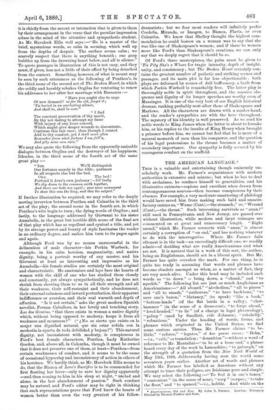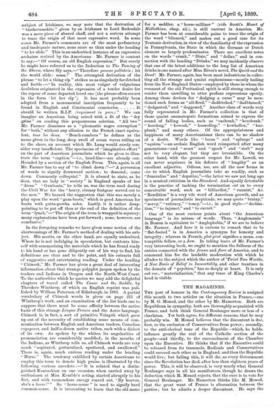THE AMERICAN LANGUAGE.*
Tins is a valuable and entertaining though eminently un- scholarly work. Mr. Farmer's acquaintance with modern authorities is extensive and minute ; but when he has to deal with archaisms, be confines himself to generalities, and his illustrative extracts—copious and excellent when drawn from contemporaneous sources—then become conspicuous by their absence. For example, a very moderate smattering of philology would have saved him from making such bald and unsatis- factory entries as, " Wame (Cant),—the stomach;" or, " Wesand (Cant),—the throat." Such interesting survivals as " anan ?" still used in Pennsylvania and New Jersey, are passed over without illustration, while modern and inept coinages are commented on at great and unnecessary length. " Right anend," which Mr. Farmer connects with " anan," is almost certainly a corruption of " on end," and has nothing whatever to do with the interrogative. Where Mr. Farmer fails oftenest is in the task—an exceedingly difficult one, we readily admit—of deciding what are really Americanisms and what are not. It is natural that in a work of this sort, the author, being an Englishman, should act in a liberal spirit. But Mr. Farmer has quite overshot the mark. For one thing, he is quite too ready in assuming that words and phrases have become obsolete amongst us when, as a matter of fact, they are very much alive. Under this head may be included such words as " to down " = bring down, a " chunk," and " to squelch." The following list are just as much Anglicisms as Americanisms :—" All aboard," " alcoholism," " all to pieces" and " all to smash," " authoress," " to have backbone," " to save one's bacon," " blatancy," (to speak) " like a book," " bottom-lands " (of the flat lands in a valley), " claw- hammer " (in the sense of a dress-coat), " to forge ahead," " level-headed," " to lie" (of a charge in legal phraseology), " peltry " (used by Smollett, vide Johnson), " rakehelly," " robustious." Under the heading of words, forms, and phrases which originated in the United States, we find some curious entries. Thus, Mr. Farmer claims " to be- little," " referee," " legatee," et hoc genus ornne ; " Bohn," " crib," or translation ; " demnition "—without a word of reference to Mr_ Mantalini—" to be at a loose end," a phrase heard every day of the week in Lancashire ; "to galumph," on the strength of a quotation from the New York World of May 13th, 1888, Jabberwocky having seen the world some seventeen years earlier. Another set of words and phrases which Mr. Farmer has labelled as American without any attempt to trace their pedigree, are Irishisms pure and simple. We may select the following :—" To feel it in one's bones," " convenient " (in the sense of near), " corp " (corpse), " to take the floor," and " to spancel,"—i.e., hobble. And while on the • Americanisms, Old and New. By John S. Farmer. London : Privately Printed by Thomas Penner and Sons. subject of Irishisms, we may note that the derivation of " blatherumskite " given by an Irishman to Lord Redesdale was a mere piece of absurd chaff, and not a serious attempt to trace the origin of that most expressive word. In some cases Mr. Farmer's comments are of the most perfunctory and inadequate nature, none more so than under the heading " to let slide." This is an undoubted instance of an expressive archaism revived by the Americans. Mr. Farmer is content to say,—" Of course, an old English expression." But surely he might have referred us to the Induction to The Taming of the Shrew, where Sly says,—" Therefore paucas pallabris ; let the world slide : sessa !" The attempted derivation of the phrase " to let a thing rip " strikes us as singularly far-fetched and feeble :—" In reality, this most vulgar of vulgarisms doubtless originated in the expression of a tender desire for the repose of some departed loved one [the phrase often occurs in the form let her rip']. It has most probably been -adopted from a monumental inscription frequently to be found in English and Continental cemeteries It should be written R.I.P. (requiescat in pace)" We can Imagine an American being seized with a fit of the " dry eine " on reading this preposterous solution. "All two " 21r. Farmer dismisses as a "pleonastic negro corruption" for "both," without any allusion to the French exact equiva- lent, tous les deux. " Beach-combers " he defines as the name given to the long, deep swell of ocean waves rolling on to the shore, an account which Mr. Lang would surely con- sider very insufficient. The specimens of "imaginative effort" on the part of American journalists which he gives to illus- trate the term " caption "—i.e., head-line--are already out- Heroded by a section of the English Press. This, again, is all Mr. Farmer has to say of " to climb down :"—" A perversion of words to signify downward motion ; to descend ; come down. Commonly colloquial." It is absurd to state, as he does, that no lady in " society " in England speaks of her " dress." " Gunboats," be tells us, was the term used during the Civil War for the " heavy, clumsy footgear served out to the men." We hazard the suggestion that this was merely a play upon the word " gum-boots," which is good American for boots with gutta-percha soles. Lastly, it is rather disap- pointing to be put of thus at the end of the definition of the term "lynch,"—" The origin of the term is wrapped in mystery; many explanations have been put forward ; none, however, are conclusive."
In the foregoing remarks we have given some notion of the shortcomings of Mr. Farmer's method of dealing with his sub- ject. His merits, on the other hand, are equally undoubted. Where he is not indulging in speculation, but contents him- self with summarising the materials which he has found ready to his hand or has gone diligently out of his way to find, his definitions are clear and to the point, and his extracts full of suggestive and entertaining reading. Under the heading -" Chinook," Mr. Farmer has given a great deal of interesting information about that strange polyglot jargon spoken by the traders and Indians in Oregon and the North-West Coast. To the authorities which he quotes we may add the delightful chapters of travel called The Canoe and the Saddle, by Theodore Winthrop, of which an English reprint was pub- lished by William Paterson, of Edinburgh, in 1883. A partial vocabulary of Chinook words is given on page 211 of Winthrop's work, and an examination of the list leads one to suppose that there must be some affinity between the native basis of this strange Lingua Franca and the Aztec language. Chinook is, in fact, a sort of primitive Volapiik which grew up out of the necessity of establishing some means of com- munication between English and American traders, Canadian -voyageurs, and half-a-dozen native tribes, each with a dialect of its own. As spoken by the whites, its angularities of pronunciation are considerably modified; in the mouths of the Indians, as Winthrop tells us, all Chinook words are very much "aspirated, gutturalised, sputtered, and swallowed." There is, again, much curious reading under the heading Horse." The tendency exhibited by certain Americans to employ this term to denote high praise, is illustrated by the following curious anecdote :—" It is related that a distin- guished Kentuckian on one occasion, when carried away by enthusiasm at Miss Kemble's acting, started abruptly to his feet, and with tremendous energy roared out, By heaven, she's a horse !" So " horse-sense " is used to signify hard common-sense. It is interesting to learn that the old name for a saddler, a " horse-milliner " (vide Scott's 'Heart of lificllothian, chap. xii.), is still current in America. Mr. Farmer has been at considerable pains to trace the origin of the word " blizzard," and makes out a good case for its Teutonic derivation, in view of the familiarity of the expression in Pennsylvania, the State in which the German or Dutch element so largely predominates. There are excellent notes on the words " crank," "Dixie," and " dollar," and in con- nection with the heading "Drinks," we may incidently observe that one of the latest additions to the long list of American drinks is one named after Miss Rives's novel, The Quick and the Dead! Mr. Farmer, again, has been most industrious in collec- ting all the strange and quaint euphemisms—mostly hailing from the New England States—employed by those in whom the remnant of the old Puritanical spirit is still strong enough to render them unwilling to utter profane expressions openly. Among these devices for " dodging a curse " may be men- tioned such forms as " all-fired," " dadfetched," " dadblamed," " dodgasted," and " doggoned." Another class of words very fully represented in Mr. Farmer's collection is that of those quaint onomatopoeic formations coined to express the sound of falling bodies, such as "cachunk," "kerchunk," " kerchug," " kewosh," " keswollup," " kewhollox," " kar- plunk," and many others.. Of the appropriateness and happiness of many Americanisms there can be no shadow of a doubt. Words like " boom " and " splurge " and " squirm "—an archaic English word reimported after many generations—and " scoot " and " spook " and " stub " may not be very elegant, but they are irresistible. On the other hand, with the greatest respect for Mr. Lowell, we can never acquiesce in his defence of " lengthy" as an excellent adjective. Odious, too, are all the new forms in -ize to which English journalists take so readily, such as " funeralize " and "deputize,"—the latter we saw not long ago in a musical criticism in the Standard. And equally detestable is the practice of tacking the termination -ist on to every conceivable word, such as " billiardist," " monist," &c. "Rendition" is a very vile word of American growth, and as specimens of journalistic ineptitude, we may quote " brainy," " nervy," " retiracy," " toney,"—i.e., in good style—" declina- tion," " to injunct," and " to excurt."
One of the most curious points about "the American language" is its misuse of words. Thus, " Anglomania " in Boston is equivalent to " Anglophobia," if we are to believe Mr. Farmer. And here it is curious to remark that to be " flat-footed" is in America a synonym for honesty and integrity ; whereas in French, plat piedsignifies a mean, con- temptible fellow, or a Jew. In taking leave of Mr. Farmer's very interesting book, we ought to mention the fullness of the entries connected with the fauna and flora of America, and to commend him for the laudable moderation with which he alludes to the subject which the author of 'Twixt Two Worlds, A New Basis of Belief in Immortality, and other treatises in the domain of " psychics," has so deeply at heart. It is only sub voe., " materialisation," that any trace of King Charles's head is visible.



































 Previous page
Previous page